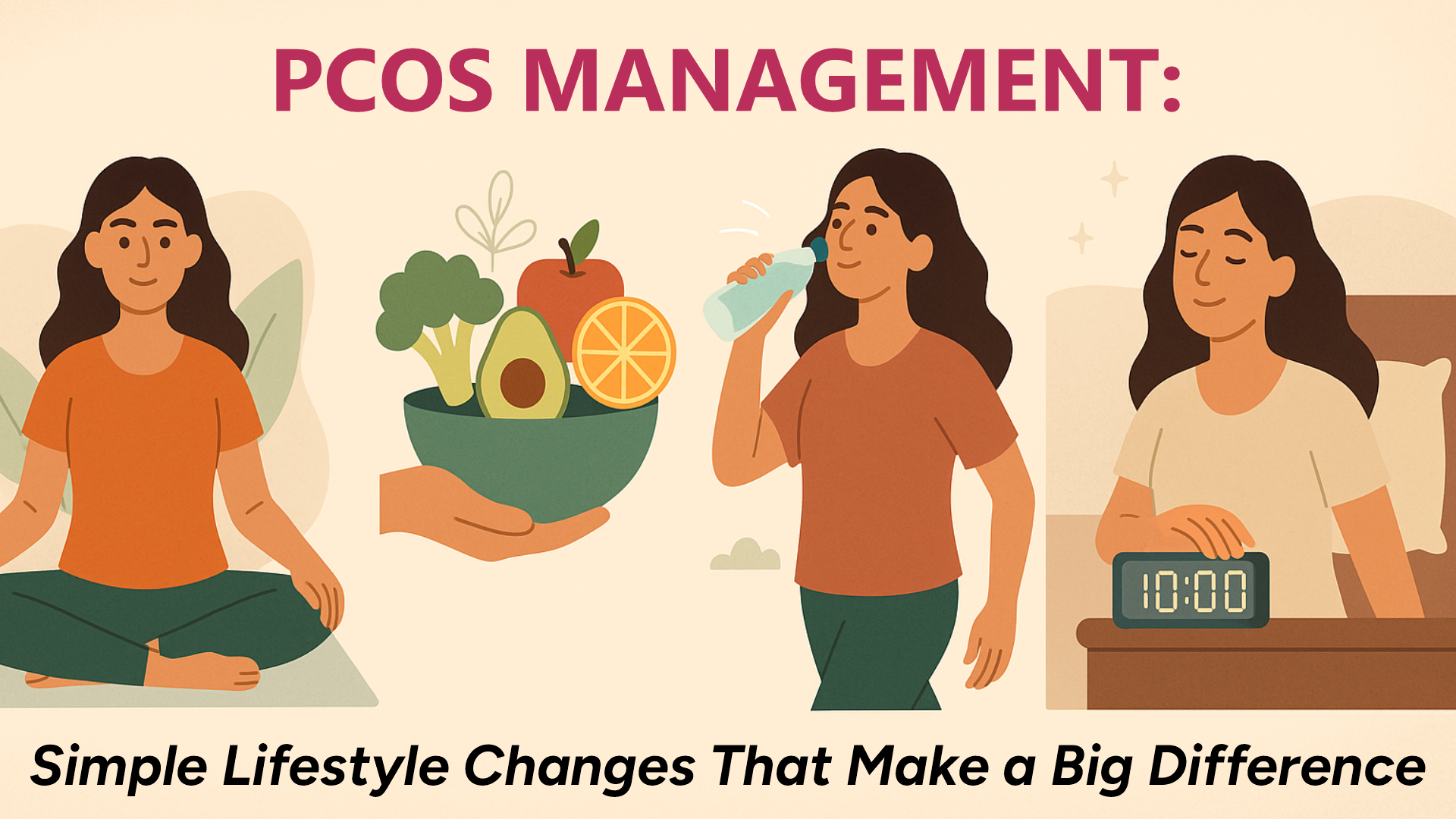
PCOS Management: Simple Lifestyle Changes That Make a Big Difference
Understanding PCOS
Before diving into management strategies, it’s essential to understand the condition:
Note: PCOS (Polycystic Ovary Syndrome) and PCOD (Polycystic Ovarian Disease) are terms often used interchangeably. Both describe the same underlying hormonal imbalance affecting the ovaries — though PCOS is the more medically recognized term. Therefore, all mentions of PCOD below are included under PCOS for clarity.
Polycystic Ovary Syndrome (PCOS)
A hormonal disorder that causes enlarged ovaries with small cysts on the outer edges. Common issues include PCOS infertility, insulin resistance, and PCOS and pregnancy complications. Diagnosis by a gynecologist in Surat ensures accurate treatment and management.
Common Symptoms Include:
- Irregular periods or missed cycles (PCOS symptoms)
- Unexplained weight gain (PCOS weight loss tips)
- Acne and oily skin (PCOS and acne)
- Excess hair growth (PCOS and hirsutism)
- Infertility challenges (PCOS and fertility)
- Fatigue and sleep issues (sleep and PCOS)
Lifestyle Changes to Manage PCOS
While medications can help, lifestyle modifications form the foundation of effective PCOS management.
1. Balanced Diet and Nutrition
A PCOS diet plan tailored to individual needs can regulate hormones and improve metabolic health.
Key strategies:
Foods to include: High-fiber vegetables, lean proteins, whole grains, and low-GI fruits.
Foods to avoid with PCOS: Sugary snacks, refined carbs, processed foods, and excessive dairy.
Benefits: Helps manage PCOS and insulin resistance, reduces weight, and supports fertility.
2. Regular Exercise
Physical activity is crucial for hormonal balance and weight management:
Exercise for PCOS: Cardio, strength training, yoga, and pilates.
Supports PCOS weight loss tips, improves insulin sensitivity, and reduces PCOS and diabetes risk.
Enhances fertility by supporting ovulation and PCOS cycles.
3. Stress Management
Stress can worsen hormonal imbalance. Incorporating stress management and PCOS techniques is essential:
Mindfulness for PCOS: Meditation, deep breathing, and journaling. Adequate rest and sleep help manage sleep and PCOS complications. Reduces the risk of PCOS and mental health issues such as anxiety and depression.
4. Medical Guidance
Consulting a PCOS doctor ensures proper monitoring and treatment:
Regular checkups with a gynecologist in Surat like Dr. Namrata Gilitwala help track hormone levels, ovarian health, and PCOS treatment progress. Addresses PCOS and thyroid, PCOS and heart disease, and other potential complications. Guides fertility treatment for PCOS including PCOS and IVF, PCOS and pregnancy, or natural ovulation support.
5. Fertility Support
Women planning for pregnancy may face challenges due to PCOS infertility. Lifestyle modifications combined with medical care can improve outcomes:
Ovulation and PCOS monitoring ensures optimal timing for conception.Pregnancy with PCOS requires careful management to reduce risks like PCOS and miscarriage risk. Fertility interventions can be tailored to individual needs by an infertility specialist.
6. Natural Remedies
Alongside medical treatment, some PCOS natural remedies support hormone balance and symptom relief:
- Herbal supplements (with doctor guidance)
- Cinnamon or spearmint tea for insulin sensitivity
- Anti-inflammatory foods to reduce hormonal imbalance
7. Sleep and Hormonal Health
Adequate sleep is often overlooked but is critical for managing PCOS:
Poor sleep can worsen insulin resistance, weight gain, and stress. Consistent sleep patterns improve PCOS and mental health and reduce obesity and PCOS risks.
8. Long-Term Health Monitoring
PCOS can increase the risk of several chronic conditions:
- PCOS and diabetes
- PCOS and heart disease
- Sleep apnea and PCOS
- Mental health challenges
Regular screening and lifestyle modifications can mitigate these risks and improve overall quality of life.
Exercise Recommendations
Exercise for PCOS should be consistent and varied:
30–45 minutes of cardio (walking, jogging, cycling)
Strength training 2–3 times a week
Yoga for mindfulness and hormonal balance
Benefits: Supports PCOS weight loss tips, improves insulin sensitivity, reduces stress, and enhances fertility.
Stress Management Techniques
- Meditation and mindfulness practices
- Journaling and gratitude exercises
- Adequate sleep and relaxation routines
- Yoga and breathing exercises
Helps with stress management and PCOS, reduces mental fatigue, and improves overall hormonal balance
Consulting Experts
For specialized care, choose a trusted PCOS doctor or best gynecologist in Surat. Dr. Namrata Gilitwala is an expert obstetrician, infertility specialist, and cosmetic & reconstructive gynecology consultant providing comprehensive care for:
- PCOS symptoms
- PCOS infertility
- PCOS treatment
- Fertility and pregnancy management
Summary
Managing PCOS effectively involves:
- Balanced diet and nutrition (PCOS diet plan, avoiding certain foods)
- Regular exercise (exercise for PCOS, weight management)
- Stress management (mindfulness for PCOS, meditation, sleep)
- Medical guidance from experts like Dr. Namrata Gilitwala
- Fertility and pregnancy support (PCOS and pregnancy, IVF, ovulation monitoring)
- Natural remedies for symptom relief
- Monitoring long-term health risks
With these simple lifestyle changes, women can significantly improve their hormonal balance, fertility outcomes, and overall health. Early intervention and consistent care from a best PCOS doctor ensure a healthier, balanced life.




